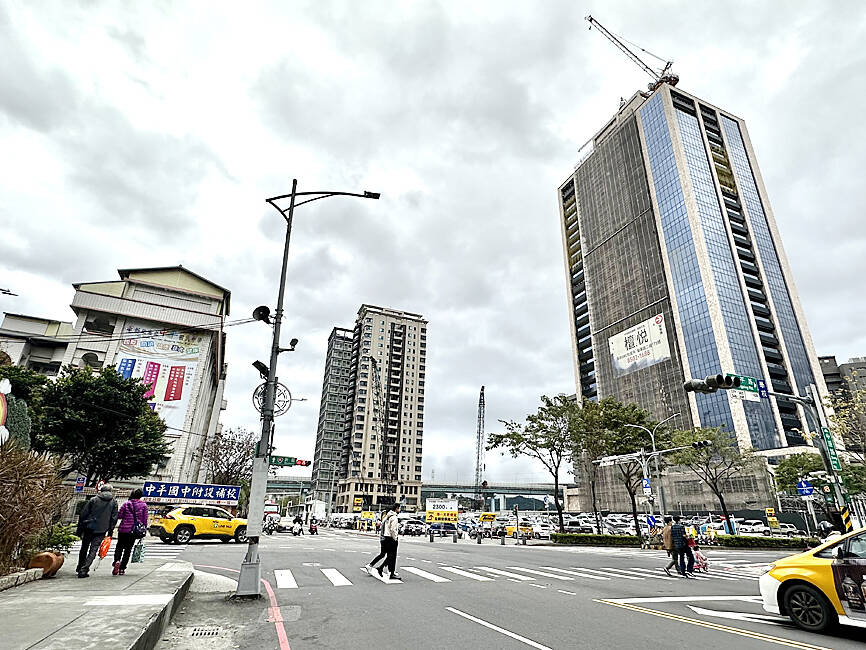Average home prices last quarter topped NT$10 million (US$327,054) in Taiwan’s major cities, despite a slowdown in transactions amid economic uncertainty, Sinyi Realty Inc (信義房屋) said yesterday.
Average home prices surpassed NT$10 million in Taipei, New Taipei City, Taoyuan, Taichung, Tainan and Kaohsiung, as well as Hsinchu city and county, Sinyi said, citing data from the Joint Credit Information Center.
FIRST TIME

Photo: Hsu Yi-ping, Taipei Times
It is the first time the Hsinchu area joined the ranking, indicating that people are becoming more amenable to the price point, Sinyi research manager Tseng Ching-der (曾敬德) said in a statement.
Home prices rose by an average of NT$2.83 million and NT$4.11 million in Hsinchu City and Hsinchu County respectively from October to December last year, compared with four years earlier, Tseng said.
The pace is faster than an average gain of NT$1.83 million in New Taipei City, Taoyuan and Tainan, he added.
“Even though the housing market slowed down in the second half of last year, developers pressed ahead to deliver pre-sale homes and pushed up overall housing prices to record highs,” Tseng said.
Price hikes were most evident in areas where major technology firms launched new plants, creating well-paying jobs, namely Hsinchu, Tainan and Kaohsiung, he said.
A person who buys a NT$10 million home could take out a mortgage of up to NT$8 million, which would translate into monthly mortgage payments of NT$30,000 based on a 30-year mortgage plan with an interest rate of 2 percent, Tseng said.
‘REASONABLE’
The payments would account for a “reasonable” 33 percent of an average annual household income of NT$1.2 million, he said, adding that shorter mortgage durations could lead to unaffordability.
However, sentiment appeared divided over transactions in a poll released last month by Cathay Financial Holding Co (國泰金控), after the Legislative Yuan passed amendments to the Equalization of Land Rights Act (平均地權條例) in January to curb speculation in the property market.
According to the survey conducted from Feb. 1 to 7, the index assessing interest in selling homes fell from minus-19.3 in January to minus-20.6 last month, while the index evaluating willingness to buy homes rose from minus-57.8 in January to minus-54.1 last month.
Additional reporting by CNA

Nvidia Corp’s demand for advanced packaging from Taiwan Semiconductor Manufacturing Co (TSMC, 台積電) remains strong though the kind of technology it needs is changing, Nvidia CEO Jensen Huang (黃仁勳) said yesterday, after he was asked whether the company was cutting orders. Nvidia’s most advanced artificial intelligence (AI) chip, Blackwell, consists of multiple chips glued together using a complex chip-on-wafer-on-substrate (CoWoS) advanced packaging technology offered by TSMC, Nvidia’s main contract chipmaker. “As we move into Blackwell, we will use largely CoWoS-L. Of course, we’re still manufacturing Hopper, and Hopper will use CowoS-S. We will also transition the CoWoS-S capacity to CoWos-L,” Huang said

Nvidia Corp CEO Jensen Huang (黃仁勳) is expected to miss the inauguration of US president-elect Donald Trump on Monday, bucking a trend among high-profile US technology leaders. Huang is visiting East Asia this week, as he typically does around the time of the Lunar New Year, a person familiar with the situation said. He has never previously attended a US presidential inauguration, said the person, who asked not to be identified, because the plans have not been announced. That makes Nvidia an exception among the most valuable technology companies, most of which are sending cofounders or CEOs to the event. That includes

TARIFF TRADE-OFF: Machinery exports to China dropped after Beijing ended its tariff reductions in June, while potential new tariffs fueled ‘front-loaded’ orders to the US The nation’s machinery exports to the US amounted to US$7.19 billion last year, surpassing the US$6.86 billion to China to become the largest export destination for the local machinery industry, the Taiwan Association of Machinery Industry (TAMI, 台灣機械公會) said in a report on Jan. 10. It came as some manufacturers brought forward or “front-loaded” US-bound shipments as required by customers ahead of potential tariffs imposed by the new US administration, the association said. During his campaign, US president-elect Donald Trump threatened tariffs of as high as 60 percent on Chinese goods and 10 percent to 20 percent on imports from other countries.

INDUSTRY LEADER: TSMC aims to continue outperforming the industry’s growth and makes 2025 another strong growth year, chairman and CEO C.C. Wei says Taiwan Semiconductor Manufacturing Co (TSMC, 台積電), a major chip supplier to Nvidia Corp and Apple Inc, yesterday said it aims to grow revenue by about 25 percent this year, driven by robust demand for artificial intelligence (AI) chips. That means TSMC would continue to outpace the foundry industry’s 10 percent annual growth this year based on the chipmaker’s estimate. The chipmaker expects revenue from AI-related chips to double this year, extending a three-fold increase last year. The growth would quicken over the next five years at a compound annual growth rate of 45 percent, fueled by strong demand for the high-performance computing